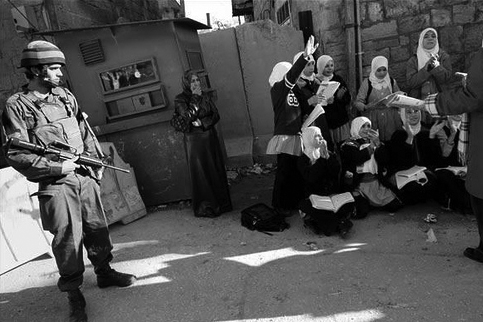Link: Israel Academic Boycott?
- Link. By Rita Cant.

- Photo: Palestinian students in the West Bank.
An angry debate was reignited in the Guardian last summer over calls for an academic boycott of Israeli universities by British ones. The United Kingdom’s University and College Union recommended boycotting Israeli academics’ “complicity” in their government’s occupation of Palestine. The act hearkens back to the 1965 academic boycott of apartheid South Africa, which the union considered instrumental in ending state-sponsored segregation.
Now they see a parallel opportunity in the Middle East.
Referencing the censure of South Africa, the boycotting scholars would decline funding, conferences and invitations for scientific collaboration with any institutional connection to Israel.
Politics of the Middle East aside, the boycott raised the more theoretical—but equally thorny—question of academic freedom in the contemporary university. The boycott was meant to condemn the systematic denial of academic freedoms to Palestinians, who to this day continue to be cut off from institutions overseas or even within Israel.
But boycotts of the boycott sprang up throughout the summer last year, accusing those British academics of trying to fight discrimination with more of the same. The role of the academy is to build bridges, said the second school of thought, and not walls. They argued that, in isolating Israel’s universities, the union contradicted the fundamentals of academic freedom: intellectual pluralism, the academic debate and peer evaluation of theory and research based on merit, sans politics and nationality.
Across the Atlantic, presidents from most major universities issued statements condemning the UCU boycott. Former Concordia president Claude Lajeunesse wrote last June, “The fundamental mission of universities, and of the academics working in these institutions, is the free exchange of information, ideas and knowledge, unfettered by dogmas, religion or politics.”
But others continued to insist that the disinterested professor with eyes only for research was a myth: that academics, like other citizens, should not be held above the policies of their democratically elected governments. They said rather than fetter intellectual debate, the boycott reinvigorated a vital discussion about Israeli policy, one that was fast becoming off-limits.
Faculty and alumni at the University of British Columbia came out against their president’s condemnation of the boycott with words of support. Tadamon, a Palestinian and Lebanese solidarity group of McGill and Concordia students and teachers, has likewise affirmed its commitment, in spite of Lajeunesse and McGill’s president, Heather Munroe-Bloom, developing an online “how-to” guide for sympathetic professors. In November, the Ryerson Student Union motioned to adopt the boycott, but the Canadian Federation of Students rejected Ryerson’s demand to follow suit.
The war of pens continues to wage, inside academia and without. David Horowitz, a right-wing American activist, continued his personal battle in his latest book Indoctrination U: The Left’s War Against Academic Freedom. In 2006 he submitted an eight-point “academic bill of rights” to state legislators, an attempt to legally force American professors to purge their politics from the classroom. Here at Concordia, teachers have been similarly persuaded to retract lessons and classroom discussions in the face of mounting pressure from some students—these same students belong to groups promoting Horowitz-style “Islamo-fascist” explanations for the Middle East conflict.
Whose academic freedom are we talking about? How can institutions and countries strike the right balance between the academic freedom of professors and students? Between Israeli professors and Palestinian students? Should classrooms be apolitical, as Horowitz insists, or is silence itself a subtle political statement? These questions are changing as quickly as tenure endorsements.
The economics of academics has changed utterly since the boycott of South Africa and the anti-war campus protests of the ’60s: corporations have more representation than teachers on university boards; lobby groups are funding research; cutbacks and new management are replacing tenured faculty with part-timers with terminable contracts; research is secondary to finding the funding; the end result is the meaning of academic freedom—and indeed that of the academy generally—is new and largely uncharted.
The Ivory Tower was eulogized years ago, but what replaced it? Not even the scholars seem to know.
Noam Chomsky, a vocal opponent to Israeli policy, rejected the academic boycott for what he saw as hypocrisy and laziness of Western academics, and futility in this kind of academic discourse. Chomsky had his own thoughts on the role of the intellectual: “One crucial goal of successful education is to deflect attention elsewhere—say to Vietnam, or Central Asia, or the Middle East, where our problems allegedly lie, and away from our own institutions and their systematic functioning and behaviour, the real source of a great deal of violence and suffering in the world.”
Does academic freedom matter outside of wine and cheeses?


